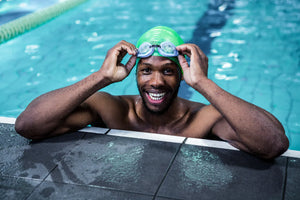Is Swimming a Sport?
One of the world’s most beloved aquatic activities, swimming offers several benefits to those who regularly hit the pool. From stress relief and mental health benefits like mood improvement to fat burning and improved sleep, there’s no question that swimming has a lot to offer.
Still, the debate surrounding whether swimming actually qualifies as a sport has been a topic of discussion for years. We’ll dive into what makes an athletic activity an official sport, the history of swimming and its Olympic roots, and how competitive swimming in the USA has gone from a recreational activity to one of the most well-established sports in the country.
How Is the Word “Sport” Defined?
Okay, so what exactly are the criteria that define an activity as a sport? Generally, a sport involves some form of physical exertion, progression and skill development, and an element of competition. Undeniably, swimming fulfills these criteria.
Some will argue that for something to be a “true” sport, it has to be objective. In other words, so-called sports that require judging cannot be defined as such because the winner is crowned based on opinion rather than something objective, like the number of touchdowns scored.
However, this definition can get dicey since most sports, even ones that aren’t judged, have some sort of referees or officials. No matter what, sports have to have some human element interfering to make calls or to justify value.
The History of Swimming: When Did Swimming Become Recognized as a Sport?
Swimming was first recognized as a sport in England in the early 1800s. It continued to grow in popularity over the years, and by 1837, the National Swimming Society was holding regular swimming competitions in indoor swimming pools all over England.
The early days of competitive swimming were not without controversy. In 1844, there was a swim competition in which two Native Americans competed using a stroke that was unfamiliar to most Englanders.
Rather than using the traditional breaststroke that was popular among Europeans, they used a variation of the front crawl, which was significantly more popular in the Americas. “Flying Gull” swam the 130-foot race in 30 seconds, winning the race.
Rather intolerantly, this was reported by the media of the time as “unrefined,” stating that the arms looked “like a windmill.” At the time, there weren’t different races for different types of strokes, and it didn’t sit well with the British that a Native American man used a technique different from that which was widely accepted at the time.
Fast forward a hundred years or so, and swimming has undergone a lot of changes. There is new swim technology, dozens of different swim events with different strokes and distances, and many more venues in which to swim.
Debunking the Arguments Against Swimming as a Sport
Despite the simple fact that swimming is a sport, there are certainly some naysayers. Here are a few arguments that people have against swimming as a sport:
#1. There Is No Contact in Swimming
Some believe that sports have to involve some level of human-to-human contact. Competitive swimmers out there in the open water are just racing against time. This is obviously a silly argument since many sports have no or limited contact.
#2. Swimming Is Merely Recreation
Some will compare swimming to an activity like jogging or walking, claiming it isn’t really a sport. While this is fair, the race itself is ultimately the sport. This is the case for walking and running, as well as swimming.
#3. The Races Are Super Short
Sure, a swim race is no three-hour football game, but just because the races are short doesn’t mean it’s not a sport! There are also short events in other well-established sports. Just because a swim meet is separated into shorter events doesn’t make it any less of a sport.
#4. Anybody Can Swim
This might be the most infuriating point of all. Sure, anyone can swim. That’s what makes swimming the best activity!
However, not just anyone can swim competitively. It takes a special kind of person with a lot of dedication and time to be a competitive swimmer.
Swimming’s Prominent Role in The Olympics
If there’s any question whether or not swimming is a sport, we can simply look to the world’s most prestigious sports arena: The Olympic Games. Swimming debuted in the Olympics in Athens in 1896 and has been making waves ever since.
Women did not begin competing until 1912 in Stockholm, but since then, the events have become very similar between men and women. In Olympic swimming, athletes use one of four strokes: the freestyle, the backstroke, the butterfly, or the breaststroke. Men and women compete in 16 events each, the four different strokes, at different distances.
In the present day, swimming is one of the most prestigious Olympic sports there is. Athletes like Michael Phelps and Katie Ledecky reign supreme in the American spotlight when it comes to US Olympic athletes and have become household names over the course of their respective careers.
What Is Training Like for a Competitive Swim Athlete?
If you have ever swam competitively, you know that the training is no joke. In the competitive swimming world, one thing that really separates swimming from many other athletic activities is that it’s not “like riding a bike.”
If you take time off of training, it can be really tough to make a comeback, requiring targeted training and maximum effort. Assuming that you stay on track, training for competitive swimmers is for the tough and determined.
Swimming competitions are not for the faint of heart! Those on a swim team, either in high school or college, will often have more than one practice per day, one being early in the morning and the other in the afternoon or evening.
Training can be grueling. For some people, a mile is their full workout, but for professional swimmers, that’s just a warm-up to get the heart rate going.
Don’t get us wrong: a mile is nothing to sneeze at, and weekend warriors will certainly get the myriad health benefits swimming has to offer. However, those training for a swimming event could be swimming miles a day, often with mixed interval or sprint training.
You might be surprised to know that many swimmers train outside of the pool as well, often utilizing weight training for a full-body workout as a method to gain strength and speed.
Conclusion
There’s no doubt that swimming is a sport; in fact, it’s one of the most popular sports of our time. The benefits of swimming, from its storied history to its Olympic status, definitely deserve a spot on the podium.
Think you have what it takes to be a competitive swimmer? Grab your swim headphones, hop in the pool, and get to work on your dolphin kick!
Sources:
An Honest Sport: 15 Truths About Swimming | Swimming World Magazine
Swimming Is the Best Full Body Workout for Your Health | Healthline
Health Benefits of Swimming | Healthy Swimming | Healthy Water | CDC



